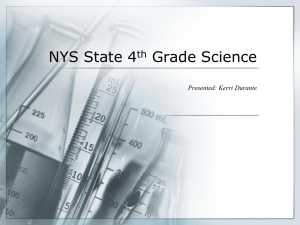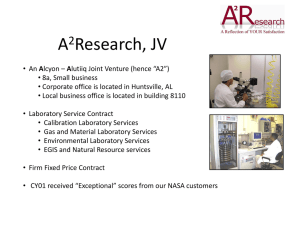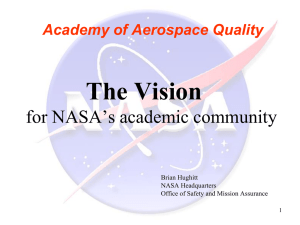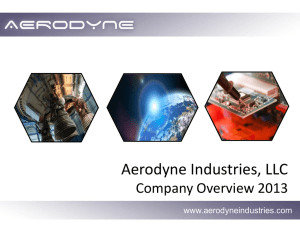Systems Engineering Beyond NASA
advertisement
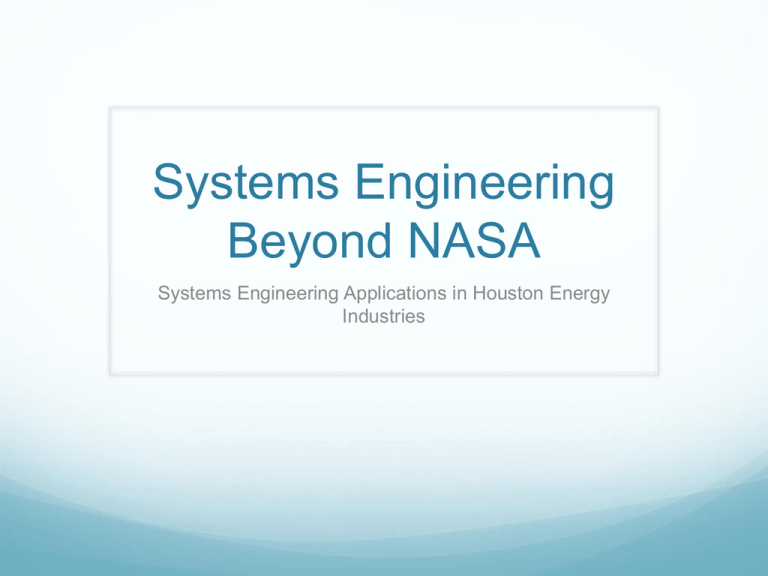
Systems Engineering Beyond NASA Systems Engineering Applications in Houston Energy Industries Goal Translate NASA Systems Engineering into terms understandable in the Houston Energy Industry Broaden perspective of Systems Engineering beyond NASA Facilitate long term build up of NASA Systems Engineering by understanding terms and identifying the right resources to bring on board About Philip 12 years of engineering projects at NASA 6 years as a PE/PM for ISS CHeCS health/medical hardware with Wyle Labs 6 years SE&I for Constellation EVA with ESCG Trade studies/analyses, requirements, verifications 4 months unemployment Interviewed and hired on as a Cost Estimator for Centurion Pipeline subsidiary of Occidental Petroleum Actually working PMO project management process improvement Disclaimer “Expertise” comes from career transition efforts and 3 months industry experience Technical Overview Systems of Interest Midstream Downstream Upstream Upstream Involved in removing oil from the ground/ocean Drilling, extracting Projects include: Product/Technology Development Horizontal Directional Drilling Hydraulic Fracturing “Fracking” “Christmas Trees” Pumps, valves, control systems Building new systems for oil production “Capital Projects” Upgrade/improvement/maintenance of existing facilities “Operations Projects” Houston companies FMC Technologies, Halliburton, Technip, Occidental, Shell, Chevron, etc. Midstream Moving oil/gas from drilling sites to production/refineries Pipeline companies Trucking/train transport Less engineering, more transport/logistics Projects: Less technical, more land and legal – broader big picture to integrate the system Build up of new facilities/capabilities – “Capital” Improvement of pipeline infrastructure – “Operations” Houston companies: Centurion Pipeline, Kinder Morgan, Spectra Energy, Plains All American, Magellan Downstream Chemical and petroleum refining Projects include: High-pressure “turn-around” or “shut down” projects Time is money, project must be very well understood and choreographed Development of modular refinery equipment - Ventech Capital and operational projects Typically the Houston ship channel refineries in Pasadena, Texas City, etc. Lyondell Bassell, Dow Chemical, Valero, Marathon Organizational Overview Project Life Cycle NASA/GOV’T Start Project CONTRACTOR NASA AEROSPACE Feasibility and Scope OWNER/OPERA TOR Requirements Design Fabrication Start Project Feasibility, Scope, and Cost Estimating OIL/GAS/CHEMICAL Scope, Requirements, Design Verification and Acceptance EPC, HARDWARE/SERVICE PROVIDER Construction Commission and Handover to Operations Owner Operator Similar to NASA-gov’t role as “customer” to contactor work force Big names like Exxon, BP, Chevron, Shell, etc. Provides the business case/rationale for a project Systems Engineering roles: Develop business case into a technical project scope Assess feasibility and trade-offs of project Part of “FEED” – Front End Engineering Development EPC’s Engineering, Procurement, and Construction Engineering support contractors Utilized in all sectors of oil/gas/chemical Picks up at Project Start Continued FEED effort of requirements/design development Oversight of construction through commissioning Typically Project Manager/Project Engineer roles Employers: S&B Engineering, Jacobs, WorleyParsons, Bechtel, Mustang Products/Service Providers They may follow their own product development life cycle May also integrate with life cycle of EPC and/or Owner/Operator Companies like FMC Technologies, Halliburton, Ventech, GE Roles/Responsibilities Terminology Difference NASA Systems Engineering – Cradle to Grave technical project development life cycle Systems Engineer in oil/gas – the engineer who is a specialist in a certain type of petroleum production system Typically an 15-20 year engineer Not typical for a NASA systems engr to transition into this role FEED – Front-end engineering development The conceptual, requirements, and early design phase of a project Common terminology in oil/gas/chemical Project Engineer NASA systems engineer = project engineer Technical leadership/coordination of a project 5-15 years engineering experience Also known as: Reservoir engineer – upstream drilling projects Improvement engineer – downstream facility upgrade projects Facility engineer – treats a facility as a project, slightly different than NASA facility engineer Project Manager NASA systems engineering + cost/schedule/administrative duties Typically more experienced 10-20 year engineers Utilized in all sectors Some very technical, others more managerial Also called: Product Managers Project Coordinators – often a career predecessor to becoming a PM Safety, Environment, and Health A subset of NASA-systems engineering, but a HUGE deal in oil/gas Needs a grasp of the big picture of a project and how it impacts safety, environment, and health Often a big enough task to warrant a dedicated engineering team to take on these tasks Technical, diplomatic, and coordination-oriented Project Controls The business end of Systems Engineering Historically a job for “business majors” but some places are looking for more technical/systems acumen to be able to do “controls” related tasks Tend to be hands-on, going out to facilities/job sites to interface with team members Common Job Titles: Project Scheduler Cost Estimator Cost Engineer Continuing Education Project Management Institute (PMI): Project Management Professional (PMP) certification is HUGE! Very similar in nature to CSEP Six Sigma green/black belt also very marketable Wrap Up Technical Systems Engineering in Oil/Gas projects Product/technology development Well-orchestrated construction Business Owner Operator vs EPC Different phases of SE&I life cycle Similar dynamic to JSC community Roles/responsibilities Actual job titles with SE&I applications Wrap-Up NASA systems engineering from an outside perspective An opportunity to connect dots between NASA and industry Questions?
